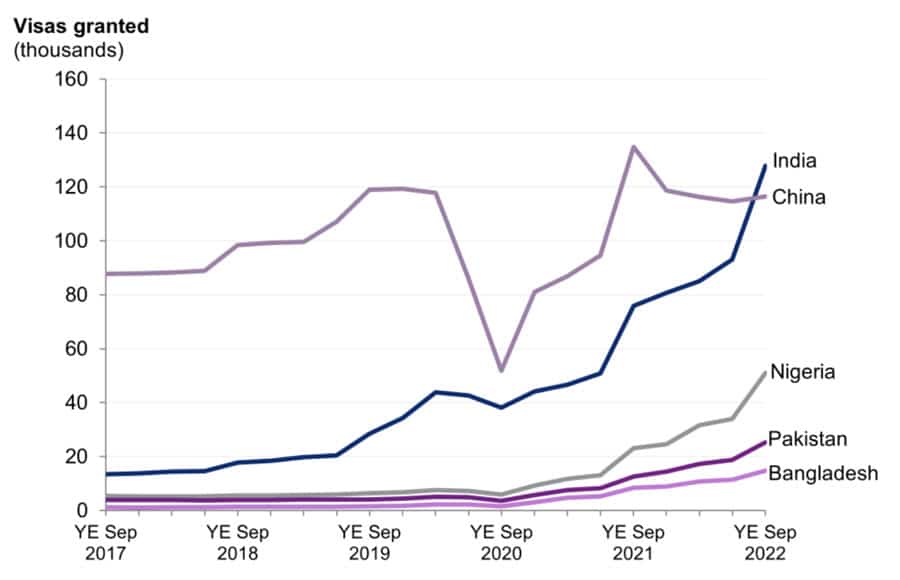UK visa numbers reflect surging international enrolment in 2022/23
- Rapidly growing enrolments by Indian and Nigerian students are driving a spike in study visas issued by the UK through September 2022
- Total visas issued in the 12 months leading to September 2022 are up 77% over the same period in 2019
The current surge in international demand for UK higher education is on full display in the latest Home Office figures, this time for the 12 months ending September 2022. The government data indicates a total of 476,389 study visas issued for the period, which represents a 77% jump over the same period in 2019 and a 24% increase over the year prior.
The Home Office comparisons to 2019 are noteworthy as they reflect an attempt to compare current volumes of visa applications and visa issuances with those from just before the onset of the COVID-19 pandemic. Even so, a government statement accompanying the data release advises that any such comparisons be made carefully: "Annual figures are unable to account for changes in travel patterns following the pandemic, which may have led to more students applying for visas in the year ending September 2022, and so comparisons should be treated with caution at this point."
In other words, it is impossible to know the extent to which the increase in study visas this year represents the beginning of a longer-term trend, as opposed to a more immediate spike in student numbers arising from deferrals during the pandemic.
The Home Office data shows that roughly 96% of all study visa grants this year were for non-EEA students (as of January 2021, and the UK's formal departure from the European Union, students from the EEA now also require study visas).
Chinese and Indian students accounted for just over half (51%) of all visas issued through September 2022, but the data shows continuing growth from other important sending markets as well, including Pakistan and Bangladesh. Nigeria accounted for the most dramatic increase in visa numbers, however, with 650% growth between 2019 and 2022 (and about 51,000 visas issued to Nigerian students through September 2022).

As we see in the preceding chart, the rapid rise in Indian enrolment is the other major factor driving growth this year. For the first time, India has surpassed China as the number one sending market for the UK – this on the strength of a 273% increase in visa issuances for Indian students between 2019 and 2022.
In a more muted version of a pattern we are seeing play out in other major destinations this year, that Indian surge is also being offset in the UK by a decline in Chinese numbers. The number of study visas issued to Chinese students fell by -2% between 2019 and 2022.
The return of net migration
The spike in international student numbers this year has once again spurred a conversation in the UK around foreign students and net migration – a theme that harks back to policies and debates of years past that sought to limit international enrolment in the country.
A number of media reports this week suggest that the British government has a refreshed interest in limiting students as it works to control net migration levels.
The international education sector was quick to push back. Universities UK Chief Executive Vivienne Stern said in response:
"Cutting international student numbers would run directly counter to the government’s strategy to rebuild the economy – given the huge financial contribution they make to every part of the country.
International students make a net positive contribution of at least £26 billion per year to the UK economy and are the source of almost 70% of our education export earnings…Limiting international students would be an act of economic self-harm that would damage many parts of the country the government aims to make more prosperous.
We should be proud that UK universities are held in such high esteem around the world that we are one of the most popular places to study. Instead of doing down a great strength of the UK, government should support it. We need a long term, stable policy approach in international visas, which is tough on abuse but supports long term, managed growth."
For additional background, please see:
















